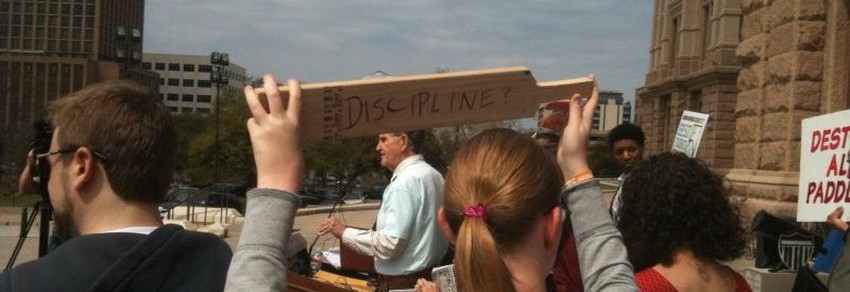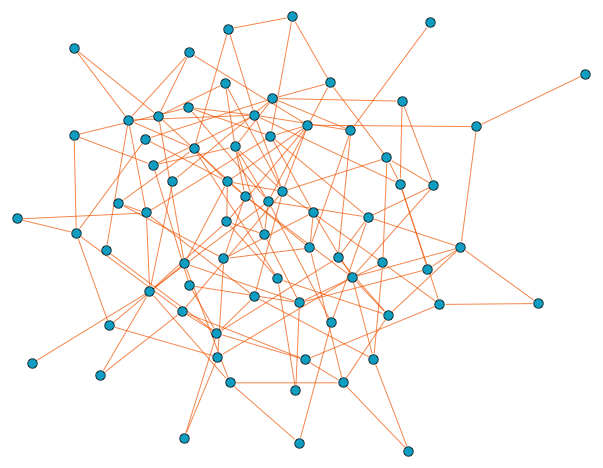Every year thousands of young people are sent against their will to facilities designed to control their behavior. These facilities have several different names – boot camps, behavior modification facilities, wilderness therapy, gay conversion – but they are all marketed to parents who feel like they need to change their child’s behavior and are known collectively as the Troubled Teen Industry. These services claim to fix anything the parent thinks is a problem; being disrespectful, staying out late, drug use, entitlement, or playing too many video games can all fall under this category. The method of diagnosis is often a brief online questionnaire that is almost guaranteed to yield some kind of disorder. If the parents decide to heed the program’s advice, their children are trapped in highly unregulated and often secluded camps with no means of defense or outside contact.
Discipline interventions like these programs have been calculated to increase recidivism by as much as 8%, compared to counseling intervention which decreases recidivism by approximately 13%. Everyone acts based upon the gain of satisfaction and the avoidance of pain, but the brain is much more likely to remember and repeat the instances of satisfaction because it likes to block out memories of painful situations altogether. Furthermore, even if the punishment is well remembered, it will be directly related to the child’s image of the punisher, which will result in resentment and emotional distance. Positive reinforcement, contrarily, strengthens not only the desire to have good behavior, but also the desire to please the rewarder. Not only does the extreme isolation and daily abuse of these discipline camps statistically raise the chance of re-offending; it is also infamous for causing lifelong emotional damage.
Whether these programs work or not (most don’t), all of them deny young people any say in whether they get to participate. The people who work at them either treat healthy and normal behavior as a problem or fail to understand the importance of consent in the treatment of any potential issue. These industries are unregulated and unlicensed, and there have been countless horror stories about them. An entire industry has developed as a way to push blame on young people, give their parents complete control over their treatment, and subject them to unforgivable abuse.
Types of camps
In these facilities, the “therapy” provided varies, but it generally includes food and sleep deprivation, vigorous labor, verbal and physical abuse, and humiliation. In more extreme cases, young people have experienced solitary confinement, sexual abuse, and have even been killed, yet the industry profits $1.2 billion a year while doing it.
Boot camps
Boot camps, a type of behavior modification camp, employ military methods to address drug use or other psychological issues. However, rather than being reformed, youth participants often suffer physical and emotional abuse, including limited access to food and water, and even sexual assault. Young people are often forced into boot camps by their parents or by courts as an alternative to jail for “disruptive teens.” Unfortunately, the tactics used in a traditional boot camp can be shockingly severe, and abused youth have been beaten, forced to eat their bodily fluids, and strip-searched while attending these compulsory programs. Tragically, young people have also died at these camps. In 2006, Martin Lee Anderson passed away after he collapsed from a genetic condition of which he was not aware. Rather than seeking medical care for the boy, who was having trouble breathing, the guards chose to abuse him through physical beating and suffocation. He is not the only victim, and other participants in behavior modification programs have died from causes such as drowning, hypothermia, restraint, suicide, and beating.
Wilderness therapy
According to proponents of wilderness therapy, “nature is utilized as a unique, therapeutic environment for healing, growth, personal discovery, and positive change.” Participants may engage in traditional outdoor activities, such as cooking or building fires, and the environment is meant to resemble “real life in that clients face challenging situations, pressures, and demands.” Unlike boot camps, true wilderness therapy does not take inspiration from the military and some young people may find this type of program helpful. However, there are multiple cases in which young people have been injured and even killed as a result of extreme activities occurring in wilderness therapy programs. Heatstroke, dehydration, and even drownings can occur if the adults running these programs are incompetent or cruel. It seems that these wilderness therapy programs often veer out of the territory their mild name suggests. Regardless of whether properly conducted wilderness therapy is effective or not, young people (not their parents) should choose whether they are thrown into nature for an extended period time.
Gay conversion therapy
You’ve probably heard of “conversion therapy,” where young people who either identify as gay or are gender non-conforming are taught to “pray the gay away,” whether it be through literal prayer or traumatic psychological conditioning. Not only is this treatment ineffective – a 2009 report by the American Psychological Association concluded that “there is no research demonstrating that providing SOCE (sexual orientation change efforts) to children or adolescents has an impact on adult sexual orientation,” it is also deeply harmful to the mental health of youth. This is unsurprising, since members of the LGBTQ community “highly rejected” by their parents are “more than eight times as likely to have attempted suicide.” Forced gay conversion treatment tries to pathologize the natural and healthy variation in human sexuality by rejecting young people and putting their lives at risk. Mental illnesses such as depression and anxiety can result or increase as a result of conversion therapy, and it is time for this disturbing “therapy” to end.
Unfortunately, only twenty states (plus D.C.) have banned the abusive practice: California, Colorado, Connecticut, Delaware, Hawaii, Illinois, Maryland, Maine, Massachusetts, Nevada, New Hampshire, New Jersey, New Mexico, New York, Oregon, Rhode Island, Utah, Vermont, and Washington. Though most states have no ban, specific cities and counties within some states have passed laws banning conversion therapy — such as Boca Raton, Florida, and Madison, Wisconsin. In another instance of progress, the practice is not financially covered by healthcare insurance in New York. Hopefully, as more awareness is spread about this horrific practice, additional states and cities will pass legislation to protect LGBTQ youth from conversion therapy.
Camps outside the U.S.
Young people are sometimes forcefully shipped out of the country to participate in a camp abroad. This option may be employed if camps are banned in a particular location; after Martin Lee Anderson’s death, state-operated boot camps were banned in Florida. Possibly the most notable example of overseas boot camps involves The Worldwide Association of Specialty Programs and Schools, which ran programs not only in the U.S., but also in Mexico, Jamaica, Costa Rica, and Samoa. As a result, this for-profit business was able to promote a widespread abuse of youth rights. The Academy at Dundee Ranch in Costa Rica and Casa by the Sea in Mexico were just two programs designed for American youth. Most WASPS centers have been shut down, but the instances of abuse, particularly restraint and seclusion, are emblematic of the potential for behavior modification programs to put youth at risk.
Abduction or “escort services” programs
Understandably, it is difficult for a parent to convince their child to want to go to a behavior modification camp. So instead of talking to their children about their troubles, they hire somebody to come to their home and remove their child by force. Some programs even offer to abduct children right from their homes. For example, The U.S. Transport Service specializes in “transporting” (in other words, forcing) young people out of their homes to these programs. Despite the seemingly innocuous name, the business of abduction is anything but, and it is perfectly legal in most states. Escort services could range from politely asking your child to go with them to the child being woken up in the middle of the night by strangers with handcuffs and violently staging what is essentially a kidnapping. Forcefully removing a child from their home often involves traumatic experiences, especially when the child doesn’t know what’s happening. According to the Alliance for the Safe, Therapeutic and Appropriate Use of Residential Treatment, also called ASTART, “Many survivors who have been ‘escorted’ to a residential program say they experience years of nightmares, flashbacks, emotional ‘numbing,’ inability to concentrate, angry outbursts, difficulty sleeping or other symptoms—primarily, survivors say, because of the trauma of being forcibly taken against their will.” Clearly, this process dehumanizes youth and quite literally deprives them of freedom.
What the law says
The Constitution falls short in many interests of youth, but one of the most alarming and undiscussed injustices is allowing transference of ownership of children and forcibly training them like dogs. Twenty states have outlawed conversion therapy, but it is still completely legal to “treat” any other distinguishable flaw that the parents find. Children must go through phases of growing where they learn what behavior is appropriate and what is harmful. They make mistakes and build their personality. It is entirely natural and necessary. Just about the worst possible response to this fragile maturing process is to impede it with merciless judgement and neglect.
The law lets parents choose how they want to punish or incentivize their children, but the camps for troubled teens are completely off the spectrum. Paying someone to kidnap children from their beds and involuntarily condition them into changing their beliefs and characteristics isn’t just “unproductive” or “potentially harmful”; it is unequivocal abuse. It’s not tough love; it’s the torture of lost and defenseless humans.
How do young people get sent to these camps?
Though one would imagine teenagers would have to misbehave drastically in order for a behavior modification camp to even consider accepting a child into their program, young people can be sent to these camps for reasons such as low self-esteem, depression, entitlement issues, family conflicts, and more. These are very common and natural issues that people on any age face, and they aren’t solid grounds to send anyone to a behavior modification camp against their will. Middle-aged women have the highest rate of depression demographically, yet it’s still considered illegal to send a middle-aged woman anywhere against her will. This means that camps that accept young people who do not want to attend are taking advantage of ageist laws.
Fighting the troubled teen industry
NYRA has collaborated with a coalition of advocacy groups to write this letter calling on Congress to shut down all private youth programs. If you want to help us free the youth held in these programs you can download the letter and email it to your Representative and Senators. Check out our Working with Elected Officials page for more tips on getting in touch. And if you’re part of an organization that would like to join the effort, you can fill out this form to sign onto the letter!
Washington State passed an even better solution, lowering the age of medical consent to thirteen so that teenagers cannot be sent to treatment against their will.








